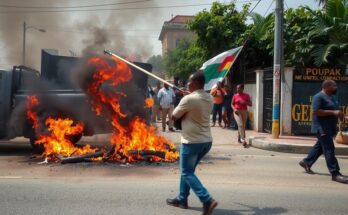The Dominican Republic has announced a plan to expel 10,000 undocumented Haitians weekly as a measure to address the rising migration crisis from Haiti amidst increasing gang violence and economic instability. This policy, which reinforces existing tough immigration stances taken by President Abinader, reflects the government’s frustrations with international responses to Haiti’s crises and raises concerns about human rights associated with such deportations.
On Wednesday, the Dominican Republic announced a significant initiative to expel 10,000 undocumented Haitian migrants weekly as part of its efforts to address the escalating migration crisis from Haiti. Presidential spokesman Homero Figueroa articulated, “This operation aims to reduce the excessive migrant populations detected in Dominican communities,” indicating that the expulsions would commence “immediately” while adhering to stringent protocols that safeguard human rights. This decision arises from frustrations regarding the international community’s perceived lethargy in restoring order to Haiti, which has been plagued by violence predominantly perpetrated by criminal gangs. In a related framework, a United Nations-sanctioned military force led by Kenya has recently been mobilized to aid in stabilizing the region. President Luis Abinader stated, “We warned at the United Nations that either it and all the countries that had committed themselves act responsibly in Haiti, or we will,” underscoring the Dominican government’s challenges with the situation. Since his inauguration in 2020, President Abinader has maintained a stringent stance towards Haitian migration, including the construction of a 164-kilometer border wall and an escalation of deportations, which have already totaled 250,000 this year alone. The newly announced plan is set to increase deportations dramatically, targeting the 495,815 Haitians residing in the Dominican Republic according to official data. Figueroa emphasized efforts to identify and dismantle human trafficking networks operating between the two nations, along with an enhancement of drone surveillance at the border. The Dominican Republic, which occupies the eastern portion of the island of Hispaniola and primarily speaks Spanish, has a historically tense relationship with Haiti, its significantly impoverished neighbor where French and Creole are primarily spoken. Economic turmoil and gang violence, compounded by the catastrophic earthquake of 2010, have driven Haitians to seek refuge in the Dominican Republic, a nation recognized for its burgeoning economy and vibrant tourism sector. The United Nations Human Rights Office has reported over 3,600 fatalities from gang violence in Haiti this year, alongside the displacement of more than 700,000 individuals, with children constituting over half of this demographic. Throughout the presidential campaign, both Abinader and his principal rival rebuffed calls from the international community to accommodate more Haitian migrants. Furthermore, Haitian expatriate communities in the Dominican Republic have frequently cited experiences of systemic discrimination and racism from various sectors, including governmental and security entities.
The context surrounding the Dominican Republic’s recent policy announcement can be understood through its historical and contemporary migration issues with Haiti. Dominicans and Haitians have shared a complex, often fraught relationship marked by economic disparity and social tensions. Following Haiti’s 2010 earthquake, the country has endured significant instability, prompting mass migration to neighboring Dominican Republic. Current challenges presented by widespread gang violence in Haiti have exacerbated this situation, compelling the Dominican government to enforce stricter immigration parameters to manage the influx of undocumented migrants. This backdrop is further complicated by international responses and humanitarian concerns regarding the protection of migrants’ rights.
In summary, the Dominican Republic’s plan to expel 10,000 undocumented Haitians weekly marks a significant escalation in its migration policy in response to ongoing challenges from Haiti. As the situation develops, it raises critical questions about the humanitarian implications, the geopolitical dynamics in the Caribbean region, and the responsibility of the international community towards stable regional governance. Efforts to monitor and alter human trafficking practices alongside increasing surveillance efforts reflect a dual approach to managing this complex issue while highlighting the precarious balance between national security and human rights.
Original Source: www.hindustantimes.com




